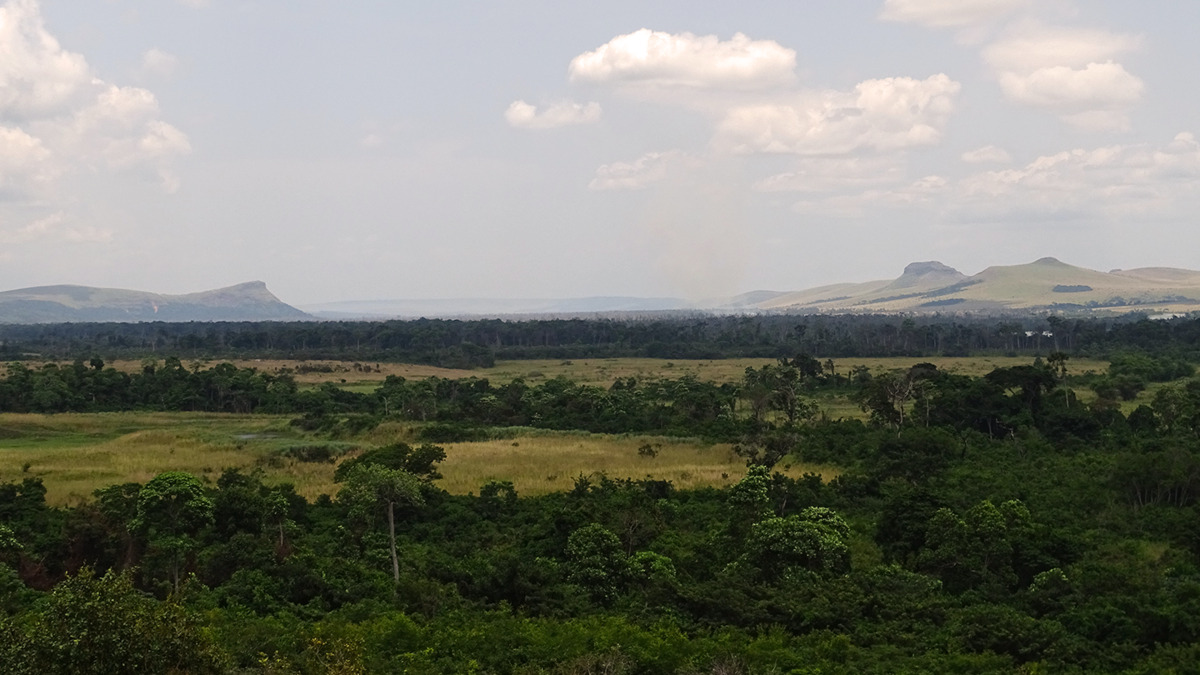Central Africa & Gulf of Guinea
Why WCS?
WCS has a significant presence in Central Africa with a strong conservation, protected area management, livelihoods, policy and scientific program. Central Africa includes some of the largest country programs in WCS's Global Conservation portfolio, in terms of staffing, budget, and diversity of projects, and a strong WCS legacy that dates back to the 1950s. The program includes one of WCS's flagship site-based programs in Africa (the Nouabalé-Ndoki National Park in the Republic of Congo) and has spearheaded and assisted with a number of pioneering conservation management models over the last 30 years, including private-public partnerships for integrating conservation in sustainable, multiple-use forest management and the creation of Gabon's world famous national park network (terrestrial and marine).
18 protected areas
WCS is currently a part of numerous partnerships to support the management of 15 terrestrial and three marine PAs in six countries in Central Africa covering an estimated 209,338 square kilometers. We are also currently working toward the creation of four new PAs covering 62,555 square kilometers.
4 great ape species
Between our Central Africa and Sudano-Sahel regions, WCS works to protect all four great ape subspecies in Africa, from the critically endangered Grauer’s gorilla in DRC, where we are working at the sites most crucial for their continued survival, to the mountain gorillas in Rwanda, Uganda, and Democratic Republic of Congo (DRC). Within WCS landscapes in northern Congo, we work to protect the single largest population of wild western lowland gorillas on the planet.
On Our Strategies
Develop Effective Partnerships for Terrestrial and Marine PA Creation and Management
This is done through private-public management partnerships, co-management, and technical support to protected area agencies. It includes all aspects of protected area creation, planning, and adaptive management including law enforcement, infrastructure, research and monitoring, innovative tourism development, and more. The establishment of a well-managed network of terrestrial and marine parks can form the cornerstone for long-term conservation, security, and development.
Assist Development of Full-Chain Law Enforcement Programs
Intelligence-led anti-poaching efforts (including terrestrial, marine, and aerial surveillance), anti-trafficking (at landscape, national, transboundary levels), and legal follow up on prosecutions, will work to halt illegal wildlife trafficking and poaching, and improve governance at local, national, and international scales.
Encourage Sustainable Landscape-Scale Planning and Management
This includes community-based resource management (fisheries, wildlife management, non-timber forest products, agroforestry and sustainable production of agricultural products such as cocoa), alternative sustainable livelihoods partnerships; extractive industry best practice partnerships and certifications (timber, mining, oil); and partnerships with tourism operators. Within this is land-use planning with ecologically sound zoning, set-asides, and corridor establishment outside of protected areas, and road planning. It further encompasses climate change adaptation and mitigation programs and integrating human-wildlife health interface concerns in management interventions.
Improve the Well Being of Local People
People depend on the forests, rivers and oceans of Central Africa for their water, culture, food, shelter, and their livelihoods. WCS is working to improve the well-being of those in and around cities as well as near our field sites. We're doing this in three main ways:
- We are working at new scales and with new partners to improve food security. The single biggest threat to wildlife in Central Africa is the commercial bushmeat trade; neither protein alternatives nor law enforcement alone can solve this complex issue.
- In DR Congo, we are attempting to pilot new models of community-based management of wild places.
- We are aiming to provide appropriate market- and non-market based incentives for families to engage in conservation practices and to steward the wildlife they live with and the natural resources they depend upon.
Work with Both Government and International Partners to Mainstream Green Development
This can positively influence major infrastructure and macro development planning through scientific guidance and policy support, including influencing dam and hydro plant construction, major road development, and macro zoning plans for development projects in the countries of the Central Africa region. Also, we are working to promote "green" energy options to reduce pressures on natural resources and manage and reduce charcoal production.
Related News
-
July 11, 2023
WCS Welcomes Designation of Northeastern Central African Republic Protected Areas Complex and its Functional Landscape as a Biosphere Reserve (English and French)
The Northeastern Central African Republic Protected Areas Complex and its Functional Landscape is one of the 11 new biosphere reserves in the World Network.
Read the story
-
June 30, 2023
Fatal Attack on Eco-guard in DRC’s Okapi Wildlife Reserve (English and French)
Read the story
-
June 8, 2023
Release of “Bushmeat,” a Book Promoting a Holistic Approach to Wild Meat in Central Africa, Supports WCS Vision
Democratic Republic of Congo expert Theodore Trefon published "Bushmeat: Culture, economy and conservation in Central Africa," supporting WCS’s ‘From the Forest to the Fork’ conceptual framework for a more holistic approach to bushmeat to...
Read the story
View All News
WCS Welcomes Designation of Northeastern Central African Republic Protected Areas Complex and its Functional Landscape as a Biosphere Reserve (English and French)
The Northeastern Central African Republic Protected Areas Complex and its Functional Landscape is one of the 11 new biosphere reserves in the World Network.
Read the storyFatal Attack on Eco-guard in DRC’s Okapi Wildlife Reserve (English and French)
Read the storyRelease of “Bushmeat,” a Book Promoting a Holistic Approach to Wild Meat in Central Africa, Supports WCS Vision
Democratic Republic of Congo expert Theodore Trefon published "Bushmeat: Culture, economy and conservation in Central Africa," supporting WCS’s ‘From the Forest to the Fork’ conceptual framework for a more holistic approach to bushmeat to...
Read the storySign Up for Email Updates
Get news from the field and learn about ways you can help Earth’s most threatened species.












